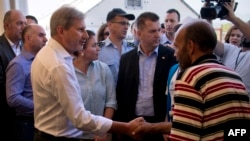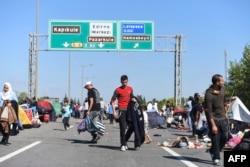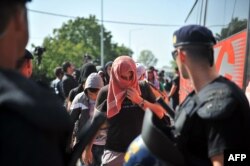Italy's Coast Guard said more than 4,500 people were rescued Saturday off the Libyan coast, as calm seas triggered a rush of migrants trying to reach Europe in overcrowded boats and barges.
A Coast Guard statement said the agency coordinated 20 rescue operations, and that a woman's body was found in one inflatable boat. Greek rescuers and ships from Germany, Croatia and Britain were also involved, along with personnel from the medical group Doctors Without Borders.
"We started before first light this morning with our first rescue. We rescued two wooden boats and two rubber dinghies," emergency medical coordinator Simon Burroughs told AFP. He said those rescued included Eritreans, Nigerians, Somalis, Libyans, Syrians and West Africans.
Saturday's migrant surge came after nearly a week of bad weather slowed the maritime migrant flow to a crawl. It also came as European leaders continued struggling to cope with the largest movement of humanity on the continent since World War II.
Elsewhere, Austria braced Saturday for as many as 10,000 more migrants, after Hungarian authorities late Friday shifted tactics and began transporting thousands of migrants to the Austrian border.
In one instance, some 1,600 migrants on buses provided by Hungary arrived in the Austrian border town of Heiligenkreuz, where they boarded buses to Vienna and Austria's second-largest city, Graz.
"We see the pictures, how the situation is at other borders where people are treated badly," said Lieutenant Colonel Manfred Tschank, a local police commander. "We, the Austrian police, assisted by the Austrian army, have a slightly different approach. We try to calm the people down. We try to build an atmosphere of confidence, and we have succeeded so far. The people feel safer [in Austria] than in other countries. This is to our advantage but also to the advantage of these people."
Monitors say there is no sign of a letup of mostly Syrian war refugees crossing the Balkans on foot, seeking peace and security in northern and western Europe.
As the human wave continued westward, a senior European Union official told reporters that Balkan countries needed immediate help to cope with the crisis.
To that end, EU enlargement commissioner Johannes Hahn said he had proposed $1.1 billion in aid to Turkey as part of a push to persuade migrants and refugees from Syria and Iraq to stay in nearby countries.
Separately Saturday, U.N. humanitarian chief Stephen O’Brien visited the Zaatari refugee camp in Jordan, where he praised Jordan and its people for their generosity and support of people in need.
"The very clear recent development has been the phenomenal number of people who have been motivated to move, some to Europe," O'Brien said. "And of course the response has been varied between those who will be able to be accommodated in Europe, and those would wish to have support much closer to their homes in Syria and ... their neighboring states."
Syria's civil war has forced more than 4 million people to flee their country since 2011, when the uprising against the rule of President Bashar al-Assad began.
About half have crossed into Turkey, while more than a million refugees are currently living in Lebanon and nearly 630,000 others are in Jordan.
More than 400,000 migrants, many from Iraq and Syria, have entered Europe this year. Thousands of others have died trying.
Related photo gallery








